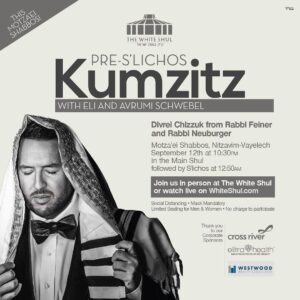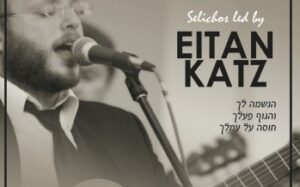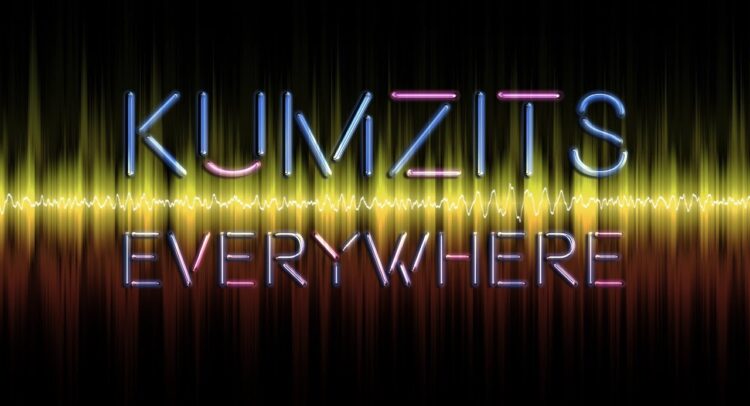Raboyseyee and Ladies,
The Pre- Rosh Hashono Concert and Kumzits:
The heylige Ois takes this opportunity to wish his burgeoning readership -both here in the United States and abroad- a meaningful Rosh Hashono, an overall givaldige yom tov, and year ahead. May the coming year bring you everything you possibly need: peace of mind, peace at home, a good piece should you find yourself on the battlefield, and above all, good health. Of course, a few extra dollars wouldn’t hurt anyone, would it?
The Ois thanks profusely his chaver and webmaster extraordinaire, Mike Kogan, who tirelessly manages the ever-growing site and makes sure the weekly parsha reviews and special editions are posted timely each week no matter where in the world he finds himself. Givaldig!
Es farshteytzich (it’s understood) that the Ois would love to speak personally with each and every reader and Ois follower before this special Yom Tov of Rosh Hashono. Alas that’s impossible as he will be busy tomorrow warding off predators at the mikveh (ritual bathhouse) where he will be doing some early dipping in advance of ushering in the New Year. For some, dipping is a segula (good omen) for other dipping’s, if you chap.
As you well know by now, Rosh Hashono is a time of year when we renew our commitment to the RBSO by making all sorts of promises we zicher won’t keep. Think of them as New Year’s resolutions which typically expire withing 30 days. Not to worry; the RBSO is not -at all- surprised by our behavior during the year. As mentioned often in the past, that’s just how He programmed us. It does appear that this version of man (and woman), was and so remains -dating back to the days of Odom (Adam)- programmed to be bad from the get-go. Let us quote the famous words of the RBSO found twice in two consecutive parshas. Says the heylige Toirah (Bereishis 6: 5-6), azoy:
| 5. And the Lord saw that the evil of man was great in the earth, and every imagination of his heart was only evil all the time. | הוַיַּ֣רְא יְהֹוָ֔ כִּ֥י רַבָּ֛ה רָעַ֥ת הָֽאָדָ֖ם בָּאָ֑רֶץ וְכָל־יֵ֨צֶר֙ מַחְשְׁבֹ֣ת לִבּ֔וֹ רַ֥ק רַ֖ע כָּל־הַיּֽוֹם: | |
| 6. And the Lord regretted that He had made man upon the earth, and He became grieved in His heart. | ווַיִּנָּ֣חֶם יְהֹו כִּֽי־עָשָׂ֥ה אֶת־הָֽאָדָ֖ם בָּאָ֑רֶץ |

Case closed! And let us also read another posik and telling words from Parshas Noiach where the heylige Toirah says this about Man 1.0
| 21. And the Lord smelled the pleasant aroma, and the Lord said to Himself, “I will no longer curse the earth because of man, for the imagination of man’s heart is evil from his youth, and I will no longer smite all living things as I have done. | כאוַיָּ֣רַח יְהֹוָ אֶת־רֵ֣יחַ הַנִּיחֹ֒חַ֒ וַיֹּ֨אמֶר יְהֹוָ אֶל־לִבּ֗וֹ לֹ֣א אֹ֠סִ֠ף לְקַלֵּ֨ל ע֤וֹד אֶת־הָֽאֲדָמָה֙ בַּֽעֲב֣וּר הָֽאָדָ֔ם כִּ֠י יֵ֣צֶר לֵ֧ב הָֽאָדָ֛ם רַ֖ע מִנְּעֻרָ֑יו וְלֹֽא־אֹסִ֥ף ע֛וֹד לְהַכּ֥וֹת אֶת־כָּל־חַ֖י כַּֽאֲשֶׁ֥ר עָשִֽׂיתִי: |
The bottom line: the RBSO recognized that Man is at the very least mischievous, that his heart is evil from his youth. Nu, what can we do? Efsher AI can help us change, ver veyst?

That being said, we daven over Rosh Hashono for the RBSO’s forgiveness and hope that He is willing to look aside and erase our indiscretions of the past year. We’ll give it one more shot on Yom Kippur and some, observant Jews, will add daily selichos before and after to gain some advantage. Does all this prayer work? Is it supposed to? Ver veyst? The bottom line: all this davening and shokeling is a very small price to pay for past chazerish (less than admirable) behavior all year round.
Selichos? What are those? Our sages teach us that three things (the sound of the shofar, adding the prayer known as LeDovid, and selichos) are supposed to arouse us in advance of Rosh Hashono. Many should taka recite them davka because they were aroused when they should not have been so, in places they should not have been visiting, and with people forbidden to them; oy vey. Of course, they were aroused! Shoin. The givaldig news is that Yom Kippur is but days away and is designed to forgive such arousals you experienced the rest of the year, if you chap(ed). Ober, what are these selichos and why do we recite them at midnight on the first night, and at 9:30PM or 10:00PM, or in the AM -your choice- on subsequent days? When is the right time to chant a few thousand words we haven’t a clue what they mean? We can barely pronounce them!
Says the Medrish (Tanna de’ve Eliyohu Zuta) azoy: Dovid Hamelech (King David) introduced and instituted a special service for forgiveness when he realized that the Beis Hamikdash (Temple) would be destroyed. “How will they attain atonement?” he asked the RBSO and was told that the people would recite the order of selichos and would then be forgiven. The RBSO showed Dovid that this act of contrition would include a recitation of the “Thirteen Attributes of G-d,” a descriptive passage from the heylige Toirah (Shmois) following the Eygel (golden calf) debacle, that expresses the RBSO’s merciful nature. Veyter. The emes is that Dovid himself needed -very badly- to recite them, mischievous -and aroused- fellow that he was.
What do the words mean? Ver veyst? Do people actually recite them word by word? Mostly not! Let’s get real: Mostly we mumble our way through them. Selichos are prayers for forgiveness recited and chanted in words that are -for the most part- totally foreign to even the great majority of the well versant. What to do? How to get people -the masses- motivated to come out on a Saturday night? How to get them to chant words they don’t understand and cannot properly enunciate? These days, shuls entice us to attend a pre-midnight concert with a chazan, and or offer concerts and or a kumzits (lit: come sit, listen to music, and sing along) with musical accompaniment. The bottom line: it’s a night out, ober be sure not to confuse the midnight mass with the prayers of the masses at midnight. The RBSO mamish abhors avoido zoro!
Shoin: Speaking of recent trends at many shuls to offer -pre-selichos entertainment -the social mixer before the main event, it so happens that over in Israel, several senior Ashkenazic rabbis have signed onto a letter decrying the recent practice of shuls making “musical selichos” with singers and instruments. The signatories to the kol koreh (proclamation) wrote that those who engage in musical selichos are being “poretz geder” and turn selichos from a serious reflective moment into an “evening of entertainment.” Grada, wrong about the actual joyous mood they are not. Let’s get real: kimat everyone enjoys a kumzits, it puts us into a good mood as we sing along. Ober let’s get real: who’s coming out at midnight without the pre-game show? Not many! The bottom line: in recent times, many a rabbi has decided to market the selichos program by adding entertainment.

A what? What the hec is a poretz geder? What is the accurate definition of this term? How “severe” is this designation? Are there any punishments or consequences for someone who is labeled a poretz geder? The literal translation is “breaching a fence.” There are a few places in halacha where it states that someone who violates a rule is called poretz geder. And the punishment? Seemingly, the poretz geder gets bitten by a snake: be on the lookout! The bottom line: It seems to apply to someone who breaks a certain minhag. The good news: only the breaking of certain minhogim will earn you the moniker. The Aruch defines ‘geder’ as explained in the heylige Gemora (Beroshis 17a) which says that geder has a connotation of authority. Those who don’t follow authority – though they may be standing on legal ground not to do so- might be considered to be breaking the proverbial fence of authority.
In an on-line chat on this very topic, the Ois came across this: “Where did these abominable selichos concerts start out from? “The fish of yesteryear had more seychel….Anyone with a drop of sense knows that these are solemn days, days of awe, meant for a specific purpose and not meant for dancing away the night merrily. Are joyous concerts fitting for ימים נוראים?”
Grada, the Ois recalls from his days back in yeshiva, that on the first night of selichos, the Rosh Yeshiva gave an hour schmooze exhorting us -while crying with some fake tears- to do teshuva. A kumzits on this night? Oy vey! When did society turn these very serious tefilos in the runup to the Yomim Noraim (High Holy days) into a music festival? Which daring rabbi decided -in recent times- to change selichos into something else? Will Yom Kippur davening be next, with certain shuls turning this very solemn say into a day of daylong acapella singing, with a choir and all? Not a terrible idea; the heylige Ois and many others would likely sign on. And raboyseyee, let’s get real: those old tactics – announcing the selichos schedule without enticement no longer work; case closed. To get people out and into shul late on a motzei shabbis, shuls need to change up their programming and shoin, just like that, in recent years -efsher 25- Rabbi Shlomo Carlebach, OBM and later Eli Kranzler made this daring change. It’s been a smashing success.

Many have followed suit. Grada this past motzei shabbis, the Ois was treated to the melodious voice of Eitan Katz as he performed kumzits style at a neighbor who hosted him for a pre-selichos concert. It was mamish givaldig. Let’s make the practice of Judaism happy again!

These days, first night of selichos concerts and kumzits sing-alongs are not -yet- quite ubiquitous but they are gaining in popularity. Just the other day, the Ois came across a kumzits announcement for the EREV Rosh Hashono selichos; givaldig. As these grow, people will eventually learn more of the words they are chanting; givaldig! And gishmak! Not surprisingly, there are different minhogim (customs) as to when we begin reciting them and what time. Believe it or not, when we begin, depends not on how badly one behaved or how much you need to repent. Instead, it depends wholly on what day of the week Rosh Hashono begins. Seemingly we need to recite selichos at least four times in the preliminary round to qualify for the ‘forgiveness round’ which begins on Rosh Hashono and culminates with the finals on Yom Kippur. More details another time ober one thing is zicher: Almost all agree that we begin reciting them – that is the first time we begin each year- on motzei shabbis either days before RH, or, a full week before and all agree that we don’t begin until midnight or even at 12:30AM or 1:00AM on the first night.
Why that hour, ver veyst? Some say we begin late at night because those are the hours that the gates of heaven are open for ‘forgiveness business.’ In other words, the RBSO has His time compartmentalized and the teshuva window opens not before midnight on Saturdays, giving many the opportunity to catch a show on Netflix, Amazon Prime, and have some post shabbis pizza. Why pizza tastes better after shabbis, ver veyst? Of-course there are other reasons posited, Seemingly, our sages chapped that if they wanted a good showing at the midnight selichos service that they needed to accommodate the oilom (masses) and have now added appropriate musical entertainment. Of-course there’s nothing like a good movie just before selichos to arouse and get people into the teshuva mood and frame of mind. On the other hand, if the teshuvah window is closed until midnight, what are the people to do besides watch TV or see a movie? So happens that originally, selichos prayers were recited early in the morning, prior to dawn. There was a custom in Eastern Europe that the person in charge of prayers would make the rounds of the village, knocking three times on each door and saying, “Israel, holy people, awake, arouse yourselves and rise for the service of the Creator!” It later became common practice to hold the first selichos service — considered the most important — at a time more convenient for the masses of people. Therefore, the Saturday night service was moved forward to midnight. And that raboyseyee, is why we call them our sages, our chachomim; they were taka wise. Shoin all other reasons are no longer relevant. Veyter.

As an aside whether you love or follow Chabad or don’t, one thing is zicher; if you’re thinking about changing your minhag to follow this flavor of Judaism and chasidus, now would be an excellent time. Why now? Because unlike the Ashkenazim who begin reciting selichos the week of, or, for as many as ten days before Rosh Hashono and continue until Yom Kippur, their minhag is not to recite them during the ten days following the onset of Rosh Hashono until Erev Yom Kippur. They recite them but once on Tzoim Gedalya, the fast day immediately following RH. And one more thing is zicher: now would be a terrible time to start following minhag sefard: Sefardim, recite Selichos the entire month of Ellul preceding RH and also on the ten days leading up to Yom Kippur; that’s 40 full days, Yikes! Nu, maybe were they to wear their yarmulkas (kippot) during the day, they wouldn’t need to recite so many, ver veyst.
Though uplifted by gevaldige music and song, over at selichos the other night, the Ois was thinking azoy: why am I in shul at midnight chanting difficult unfamiliar words whose meaning is mamish lost on 99.9% of the attendees? What’s pshat? Is that what the RBSO wants? Does He want us standing there, chanting words that are difficult to pronounce and impossible to understand? How sincere can our requests be when we know not what we are saying? Would you bumble like that while asking for a bonus? Is this how we are to ask the RBSO for forgiveness?

Shouldn’t we instead be davening to the RBSO in a language we chap, with words that are familiar and heartfelt? Is it efsher time for a re-write? How about into words that are already proven, words that almost always bring forgiveness and peace at home? Shoin if only we could utter ‘I’m sorry, I love you and I won’t do that again.’ Though taka designed specifically to work with the eishes chayil, wouldn’t the RBSO be receptive to such language? Aren’t we -the Yiddin- His chosen people, not also married to the RBSO? Indeed we are; of course you recall our shotgun wedding where the RBSO held the mountain over our heads and threatened to annihilate the Yiddin unless they agreed to the wedding. Shoin!
How about English? Certainly, the RBSO speaks English; doesn’t everyone speak some? The emes is that in hyntige tzeytin (today’s times), in a technologically advanced world, efsher it’s time to consider a short email or text directly to the RBSO with words of apology. Kimat everyone has a device and knows how to write and send email. And zicher everyone, even chasiddim, know how to text and use various apps like What’s-App and other such modes of communication.
In any event, in whatever language you pray or speak, the Ois wishes each and every one of you only good tidings ahead. May the coming year and the years to follow, be filled with all that your heart desires. There’s always next year should that blessing come true. And may you all be inscribed for only good things.
Shana Tova to all!
Heylige Ois aka: Yitz Grossman
